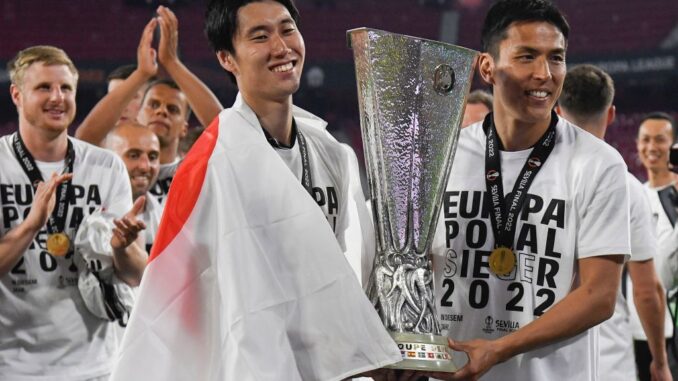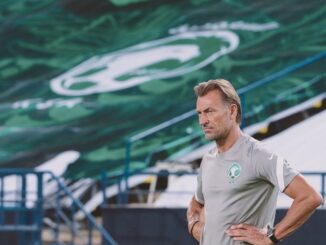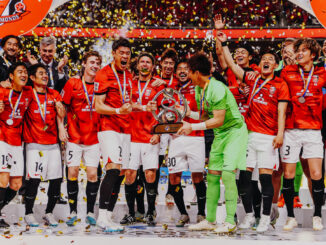
Makoto Hasebe, European champion.
It has a nice ring to it and is just reward for a stellar career that perhaps only now will get the recognition it deserves.
Japan has produced some tremendous footballers over the past two decades, many with more flare and stronger highlights reels than what Hasebe has amassed. But few, if any, can match his achievements and longevity in one of the world’s toughest and strongest competitions.
Hasebe was one of the early pioneers of this modern Japanese era that has seen players by the dozen follow his path to Germany. Hasebe made his move shortly after helping Urawa Reds to the 2007 AFC Champions League title.
His success, in immediately settling into a VfL Wolfsburg side that won the Bundesliga in 2009 – in that bygone era when clubs other than Bayern Munich won the German league – helped blaze a trail for a continuous line of Japanese players to make the move to Germany, and it’s a legacy that continues to this day with the likes of his Eintracht Frankfurt teammate Daichi Kamada and VfB Stuttgart captain Wataru Endo just two of the latest to follow his path
An unassuming presence on the field, Hasebe, now 38 and nearing retirement, is revered at every club at which he has played, a true indication of his consistency over a near 15-year European career that has taken him from Wolfsburg to FC Nürnberg and finally Eintracht Frankfurt.
It’s at the latter, where he has spent the past eight seasons, where he will be remembered most fondly.
He was instrumental in their 2018 DFB Pokal success, in which they beat Bayern Munich in dramatic fashion with a 96th minute winner, and just last night was wearing the captain’s armband as Rafael Borré slotted home the winning penalty that saw Frankfurt claim their first European trophy in 42 years.
“Makoto Hasebe has now settled a legend status at Eintracht Frankfurt,” journalist Christopher Michel told The Asian Game from Seville.
“The fans love him, he is highly respected at the club. And who knows, maybe he’ll be fit in the summer of 2023 and say he’ll play another year. But Hasebe will be remembered by (everyone) as a very good footballer, a good guy.”
He continued: “(He) is a top professional. When he plays, he gives the team a lot of security, he radiates great calm. Talents like Evan N’Dicka or Tuta have matured alongside him.
“He’s also an important part in the dressing room, he is not for nothing one of the captains circle of Eintracht. He acts a bit like a “dad” of the team. His good, calm interaction with journalists is also important for the entire club. Hasebe is a real figurehead.”
Some of his former coaches are even more effusive in their praise of the unsung 38-year-old midfielder-cum-defender.
“Makoto (Hasebe) is like a bottle of wine: the older he gets, the better he becomes,” former Eintracht Frankfurt coach Adi Huetter said back in 2019.
“He’s one of the most intelligent defensive players in the Bundesliga. (He) sprints in the head. Physically, he wouldn’t be able to overcome some opponents, but when you already know and feel where the ball is coming, it makes things easier.
“How he plays, how he reads the game, is incredible. There’s no-one better.”
No one better. It’s lavish praise, but one that sits comfortably for a player like Hasebe. For Japan, has there been anyone better in the modern era?
Trying to decide the “best” of anything is always fraught with danger; a subjective matter that is often determined by how an individual views the game. Certainly Japan has produced more technically gifted players, or ones that have played with bigger clubs and have better highlights reels.
But for impact, legacy, longevity and success, few can match the record of Hasebe.
Before he left for Europe he won the J.League, AFC Champions League and two Emperor’s Cups with Urawa Reds, and then won the Bundesliga with Wolfsburg in just his second season in the German top flight.
As mentioned previously, he was instrumental in Frankfurt’s DFB Pokal triumph in 2018 and now has a Europa League medal to top the lot, the first Japanese player to win a European title in two decades but arguably the first who has become such an important part of the fabric of the entire club.
Along the way he’s amassed 358 Bundesliga appearances – the most of any Asian player, beating the record held for over three decades by South Korea’s Cha Bum-kun – and was named in the Bundesliga Legends Network in 2021.
At national team level, he captained Japan to the 2011 AFC Asian Cup and wore the armband at three successive FIFA World Cups, at two of which Japan progressed to the knockout rounds.
While the likes of Shinji Kagawa and Keisuke Honda attracted all the headlines, Japan could not have been the dominant force in Asian football that they were during that period without the leadership and calming presence of Hasebe in the middle of the park.
With retirement slated for 2023, his next career move could prove to be even more pioneering than his initial move to Germany back in 2008.
In February this year it was announced that he had penned a new long-term deal with Frankfurt through until 2027, but far from looking to become the new Kazuyoshi Miura and play into this 40s, the deal will see the veteran continue his playing career for one more season – although he hasn’t completely ruled out playing on – before transitioning to become part of the coaching staff at the club.
“Makoto Hasebe is a player who any professional club could only wish for,” said Frankfurt board member for sport Markus Krösche.
“Despite his age, his abilities on the pitch meet the high standards of the Bundesliga. Personality-wise, he plays an important role for our youngsters in particular. Makoto is a strategist and a calming influence in our team, and his character is impeccable.
“It’s important to us that Makoto remains an example, an important point of contact and a role model for the long haul, and that we can give him his first taste of being part of a first-team coaching set-up.”
Hasebe, who is now fluent in German, commented: “Frankfurt has become my home in recent years and Eintracht are my club. We’ve achieved a lot together in the last eight years and I’m delighted that our journey is set to continue.
“I still feel fit and able to play football at a high level. Eintracht are also giving me the opportunity to take my first steps as a top-level coach, which I’m very grateful for.”
Precious few Japanese coaches have ever made the move to Europe, for a litany of reasons, and it’s for that reason Hasebe’s move from the pitch to the backroom staff could be so significant.
Given his playing career, and his leadership for both club and country over a long period of time, you’d fancy he makes a success of the transition to coaching and, like it did with his playing career, that could have far reaching consequences..
But tonight, with a Europa League winners medal hanging around his neck, thoughts of retirement and what comes next will be the furthest thing from his mind. Tonight, Hasebe stands where he belongs – at the top.
Photo: UEFA




